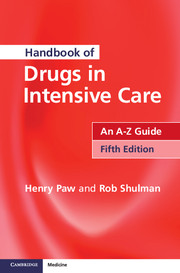Book contents
T
Published online by Cambridge University Press: 05 November 2014
Summary
TEICOPLANIN
This glycopeptide antibiotic, like vancomycin, has bactericidal activity against both aerobic and anaerobic Gram +ve bacteria: Staphylococcus aureus, including MRSA, Streptococcus spp., Listeria spp. and Clostridium spp. It is only bacteriostatic for most Enterococcus spp. It does not cause red man syndrome through histamine release and is less nephrotoxic than vancomycin. However, due to the variation between patients, effective therapeutic levels for severe infections may not be reached for a number of days using the most commonly recommended dosage schedules. Serum monitoring of pre-dose levels is recommended, particularly for severe infections.
In the UK resistance is well recognised in enterococci and coagulase-negative staphylococci and, more worryingly, is now emerging in S. aureus.
Uses
Serious Gram +ve infections:
• prophylaxis and treatment of infective endocarditis (usually combined with gentamicin)
• dialysis-associated peritonitis
• infection caused by MRSA
• prosthetic device infections due to coagulase-negative staphylococci
• alternative to penicillins and cephalosporins where patients are allergic
Contraindications
Hypersensitivity
Administration
IV bolus: 400 mg 12 hourly for 3 doses, then 400 mg daily. Give over 3–5 min
In obesity, use 6 mg/kg per dose (rounded to the nearest 100 mg) rather than 400 mg
Reconstitute with WFI supplied. Gently roll the vial between the hands until powder is completely dissolved. Shaking the solution will cause the formation of foam.
- Type
- Chapter
- Information
- Handbook of Drugs in Intensive CareAn A-Z Guide, pp. 219 - 228Publisher: Cambridge University PressPrint publication year: 2014



